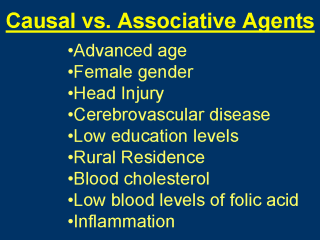| front |1 |2 |3 |4 |5 |6 |7 |8 |9 |10 |11 |12 |13 |14 |15 |16 |17 |18 |19 |20 |21 |22 |23 |review |
 |
Many associations have been made
between AD and various factors. However, population studies have not been able to
differentiate those agents that may be causative from those that are merely associative. Estrogen use has been associated with improved cognitive function. It has antioxidant and anti-inflammatory effects and enhances growth in neurons important for memory function (Maki et al 2001). Estrogen speeds up the flow of APP throughout the body, preventing it from being snipped into amyloid plaques. Thatís why it may be preventive for AD but doesnít improve outcomes for those who already have plaques deposited and symptoms of AD (Greengard et al. 2002). Patients using cholesterol-lowering statin drugs are 79% less likely to have AD than those who did not (Green et al. 2002). Possible mechanisms: - Decreased cholesterol may decrease risk of AD. - Statins may prevent mini-strokes. - Statins may affect the formation of plaques. |